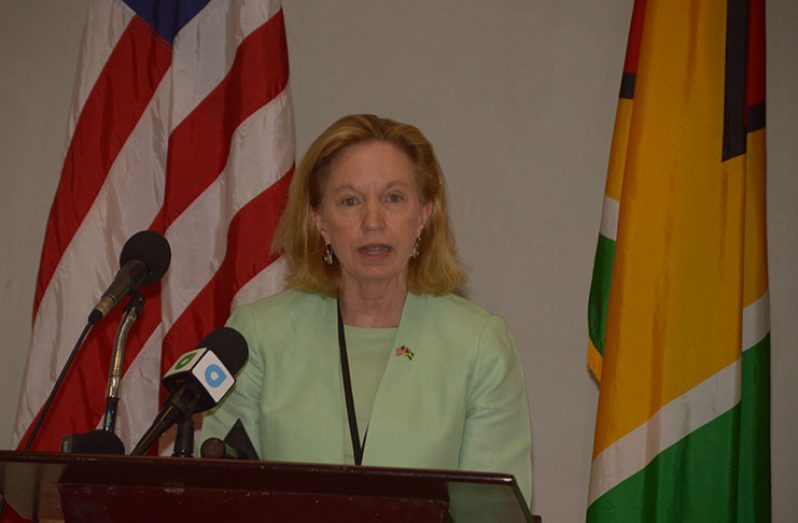US Ambassador urges Guyana to remain vigilant despite decrease
SINCE the outbreak of the Zika viral local infection in 2016, government, with assistance from stakeholders such as USAID, has been able to curb the spread of mosquito-borne diseases.
“Thanks to continuous and dedicated work to curb the spread of mosquito-borne illnesses, reported Zika cases have decreased,” said US Ambassador to Guyana, Sarah-Ann Lynch, during her remarks at the close-out event for the Maternal and Child Survival Programme (MCSP) at Duke Lodge on Wednesday.
The significant decrease in cases, compared to this time last year, suggests that the risk of infection with Zika is minimal in Guyana, but Lynch said the debate continues within the scientific community not as to if there will be another Zika outbreak in the future but rather when the next outbreak will occur. “So we must remain vigilant,” the ambassador said, adding that Zika is a terrible disease, which can affect future generations, specifically the developmental outcomes of children infected in the womb.
Although many people infected with Zika will have no symptoms or mild symptoms lasting up to a week, Zika infection during pregnancy can cause a serious birth defect called microcephaly, as well as other severe foetal brain defects.
In February 2016, the World Health Organisation declared Zika a public health emergency of international concern.
By August that same year, the US Government launched a multi-faceted Zika project to strengthen the capacity of 11 Caribbean countries to prevent Zika infection and transmission, mitigate the impact of Zika on maternal and newborn health and child development, and decrease mosquito populations through effective vector control measures.
The US Government’s support to Guyana started in September 2016, with funding provided to the Guyana Red Cross to engage communities in the prevention of Zika transmission in their neighbourhoods.
In addition, the MCSP began in Guyana during March 2018, through a partnership with the Ministry of Public Health with the aim of improving the clinical capacity of service providers to care for new-born and small babies.
“This important health partnership between the Governments of Guyana and US supported clinical and non-clinical Zika services benefitting infants, children and families across Guyana,” said Ann-Lynch.
The project also improved health workers’ ability to provide therapeutic early stimulation to children experiencing developmental delays, and psychosocial support to mothers and families affected by Zika.
“The re-vitalisation of a support group of caregivers of children with development delays, and the integration of therapeutic early stimulation into the public health nursing curriculum at the University of Guyana are among the project’s many successes,” said the ambassador.
Guyanese healthcare workers also have increased access to clinical literature and job aids to improve the quality of care and support available to affected infants and families.
While the programme focused specifically on Zika, the investments made are far-reaching and will help to strengthen the public health response to all mosquito-borne illnesses.
According to Lynch, the tools, procedures and systems developed during and after the recent Zika outbreak can be used to ensure a strong and effective response to any future outbreak and to minimize the detrimental health and development impact of Zika on future generations.
In 2018, the Caribbean Public Health Agency (CARPHA) concluded that Zika virus transmission in the Caribbean region was interrupted and that the risk to residents and visitors to the region of acquiring Zika is low.
“CARPHA advises that there is still a need to be vigilant given the ongoing risk for dengue and other mosquito-borne diseases. The agency said it maintains continuous vigilance of health and disease trends and risks for residents and visitors in the Region.
“We continue to work closely with other public health partners including US CDC, PAHO/WHO, tourism organizations public health agencies in Canada, the United Kingdom and the European Union to find innovative ways of mosquito control including behaviour change communication and research,” said CARPHA.



.jpg)








